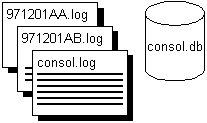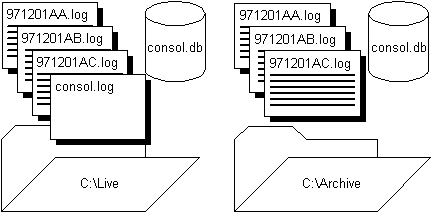







SQL Remote User's Guide
Administering SQL Remote for Adaptive Server Anywhere
Transaction log and backup management
Backup utility options
An alternative procedure is to use the backup directory as the transaction log directory.
Again, the figure below illustrates a database named consol.db, with a transaction log named consol.log in the same directory. For the sake of simplicity, we consider the log to be in the same directory as the database, although this would not be generally safe practice in a production environment. The directory is named c:\live.

The following command line backs up the database using the rename and restart option, and also uses an option to rename the transaction log backup file:
dbbackup -r -k -c "uid=DBA;pwd=SQL" c:\archive
The connection string options would be different for each database.
If you back up the transaction log to a directory c:\archive using the rename and restart option and the log renaming option, the Backup utility carries out the following tasks:
Renames the existing transaction log file to 971201xx.log, where xx are sequential characters ranging from AA to ZZ.
Backs up the transaction log file to the backup directory, creating a backup file named 971201xx.log
Starts a new transaction log, as consol.log.
After several backups, the live directory and also the archive directory contain a set of sequential transaction logs.

You can run the Message Agent with access to these log files using the following command line:
dbremote -c "dbn=hq;..." c:\archive
Old log names different before 8.01Prior to release 8.01 of Adaptive Server Anywhere, the old log files were named yymmdd01.log, yymmdd02.log, and so on. The name change was introduced to allow more old logs to be stored. As the Message Agent scans all the files in the specified directory, regardless of their names, the name change should not affect existing applications. |



